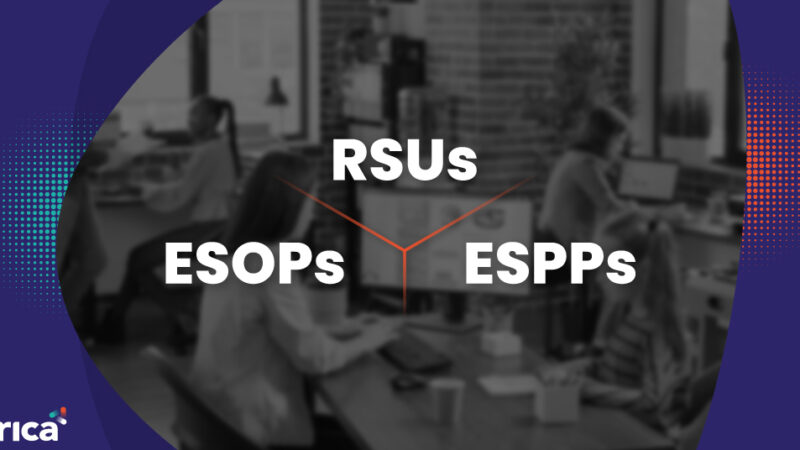
What are Stock Appreciation Rights (SARs)?
SARs are a form of bonus compensation given to employees equal to the ‘appreciation’ or increase in the price of the company stock over an established time period. This form of compensation is beneficial to the employee when the company stock price rises. Through SARs, employees can actually exercise and realize liquidity from a particular stock at any point between the time it vests and until the time it expires.
How are SARs rewarded?
In most cases, the vesting schedule of SARs is tied to performance goals. After an employee meets pre-defined performance targets, an exercise period is allocated to claim the reward. This cash compensation is calculated as the difference between grant price & FMV (Fair Market Value) on the date of exercise.
Cash Compensation (for employee) = FMV – Grant priceThe primary advantage of SARs is that they bring tremendous flexibility to employees when it comes to paying “exercise tax.” In vanilla ESOP & ESPP schemes, employees are required to pay the tax from their personal wealth, which at times becomes extremely cumbersome to them. With SARs, employees do not pay the exercise price but receive a sum due to the increase in stock prices. For this reason, SARs are eventually gaining momentum in the Indian Startup Ecosystem.
Key Terms:
- Grant Price: The base price at which the appreciation in stock price will be computed. This will be mentioned in the grant letter.
- Vesting Period: The period between the grant date and the date on which all the specified vesting conditions of SAR are satisfied. A very common vesting period is 4 years, with a one-year cliff.
- Exercise Period: After vesting, the employee earns the right to get the stock or an equivalent of the company. But the employee can get those shares or their equivalent only within a certain period of time, and this is called the exercise period or the ‘exercise notice period.’
- Expiry Date: This is the date when the scheme ends. Beyond this period, no SARs can be exercised by the participants.
Let’s consider an example to understand the working of Stock Appreciation Rights better.
An employee Arjan is granted a SAR of 10,000 shares of the company’s stock, where the grant price is INR 10 per share. The exercise period will begin once the vesting period ends and will last for 3 months, during which Arjan can exercise his right to receive cash or stock or a combination of both. Assuming that the vesting conditions are fulfilled, on the exercise date, if the FMV is INR 50 per share, then Arjan will receive INR [10,000 X (50 – 10)] or INR 4 lakh or stock worth INR 4 lakh that are equity shares of the startup.
SARs in the Indian Startup Ecosystem
Jitendra Gupta, in a webinar with trica equity, says,
Jitendra mentioned that conventional ESOPs are an unfair means of rewarding employees as these grants typically have a vesting period of 4 or 5 years. Employees with ESOPs, pay taxes upfront and realize the monetary value of grants after the vesting period ends, and that too at a liquidity event. “It is necessary to come up with equity grant schemes that have lesser vesting periods and do not lead employees to suffer a cash crunch. With SARs, employees will be able to realize the cash benefit before liquidity events,” says Jitendra.
Recently, Jupiter Money offered equity to employees in the form of SARs. As a result, they became one of the first companies to scale in the Indian startup ecosystem.
Difference between SARs & ESOPs
| SARs | ESOPs |
| No obligation of an upfront payment by the employee |
Employees are usually required to pay for the exercise price before they can get the shares |
| No taxation in the hands of the participants on granting or vesting |
Employees are taxed on exercise price without any cash receipt |
| May receive stock or cash depending on promoter discretion |
Actual shares to be issued and shareholders protection rights need to be built in |
| Taxed as Perquisites | Taxed as part Perquisites and part Capital Gains |
Note: You can give SAR/phantom stocks to consultants and part-time employees as well. Also, there is no restriction of one year cliff.
How are SARs taxed?
| Instance | Tax Position |
| Grant | No income tax in the hands of the employee |
| Vesting | No income tax in the hands of the employee |
| Exercise | This sum will be treated as a “prerequisite” received & taxed as salary income based on your tax slab. |
Click here to register for a Masterclass on the Basics of Angel Investing & Portfolio Management for Private Markets.
ESOP & CAP Table
Management simplified
Get started for free





